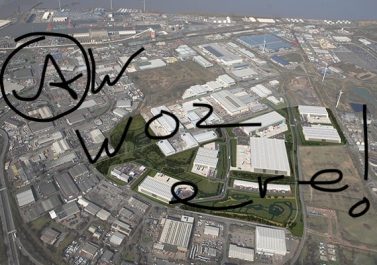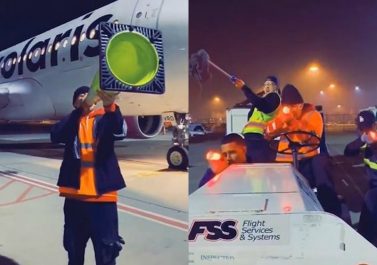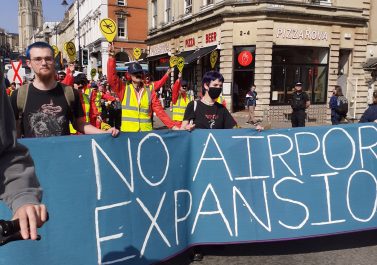EARLY JULY
Below is a report from two recent trips to speak with Amazon drivers and warehouse workers. In Croydon Solidarity Network, we regularly visit important workplaces to learn about conditions, grievances, composition and levels of militancy, and to build contacts and provide organising and legal advice. We feel that as revolutionaries we need to be establishing ourselves in the area in this way. We hope this will allow us to lay the foundations for larger organising experiments down the line and to be prepared for upturns in class struggle.
Amazon visits:
We had conversations with about 20 drivers and flyered a load more. The fact they’re waiting for the app to tell them to load up makes it much easier than when we’re flyering shift changes at warehouses. There were many Romanian and Bulgarian workers, but also some black, white and Asian British workers, some Latin Americans etc. There were no women drivers, and the age range was 20ish to 40s. In total, we saw perhaps 100 vans load up and leave the depot. We also managed to have brief conversations with 4 workers leaving the night shift. The woman was afraid to talk to us because of the non disclosure agreement that Amazon make workers sign. These particular workers hadn’t been there more than a few weeks and didn’t raise any real grievances in the short conversations we had.
The main problems workers spoke about were:
Increasing workloads and decreasing pay.
Drivers are now having to do 250-300 items per shift, with up to 150 stops. This is a significant increase on pre-pandemic levels and is as high as Christmas time. But as of June, Amazon has cut it’s global pandemic bonus to workers. This adds up to a huge increase in workload per worker. Drivers are now paid around £126 per shift for a typical medium-size van. This used to be £146 and many jobs are still advertising the increased pay, despite it having been scrapped. Shifts are in theory for 9 hours, with a theoretical 30 minute break. But no drivers are able to take their break because they risk not finishing their deliveries. If this happens they have to keep going till all items are complete at no additional pay. Worse still, another driver may be sent to help them, and depending on the reasons for the delay, the cost of the second driver may be taken out of the original driver’s pay! We asked drivers what would happen if they refused to carry on delivering and they replied, “You won’t get further shifts.”
It’s worth noting that not all drivers complained about the workloads. Most drivers had only been on the job for a few months, but those who had been on for longer seemed to be better able to deliver on time, or even faster than their expected 9 hours. One guy spoke about how experience teaches you how to massively cut corners on the job.
Lack of work, and overwork.
Many drivers complained of not getting enough shifts from Amazon. Most wanted to be doing 5 days, and some wanted to be doing 6. They pointed out that the cost of the van rent is per week, not per day. So if you’re not doing many days then you’re not making much money. Some drivers are only doing 3 or 4 days. A smaller number of drivers complained of working too much, e.g. being asked to come on Sundays, having to do 7 days etc. The obvious point here is that Amazon is squeezing more and more work into fewer and fewer shifts. Productivity per driver must be increasing significantly as clearly there’s no reason for drivers to continue doing 300 drops per shift if others are getting 3 shifts per week. Some drivers spoke of how if they finish their deliveries early, Amazon will send them for more, and they have directly justified the increased workloads to them by saying the drivers were finishing too early and had nothing to do.
Van rental.
Vans are rented directly from agencies at a cost of £220-250 per week. The agencies hold the first 5 weeks of pay as a deposit for the cost of the van and any damage to the vans during the driving. Drivers who have their own vans save a lot of money here and seemed to be less pissed off than other drivers. Drivers are able to claim back part of the fuel costs, we believe around 50%, but the rest has to come out of their pay. If drivers are getting 5 shifts a week, then after van rental, they will receive £380 per week. This is before any fuel costs, van damage costs, penalties for late running or tax. It also implies around 45 hours of work with no break. So we are looking at below minimum wage pay for many drivers.
Front seat parcels
If you stand by the warehouse and watch the vans coming out, you’ll notice that most have a huge pile of parcels on the passenger seat. This is because the vans are so overloaded that the managers force the workers to take some at the front. This is dangerous because it can both cause an accident if a parcel falls and distracts the driver or falls into their pedal-space and it makes the vans clear targets for robbery, with the driver constantly having to leave the van in plain sight while delivering. One of the drivers was certain that this practice is also illegal. We asked them if they had challenged the managers, they said yes and management had just said, “It’s your job, you have to do it.”
Warehouse workers
We spoke to about 15-20 and the response was quite positive. One person said there were about 30 workers working at a time, but most were on temporary contracts or working through agencies (his point was that organising would be difficult). This person had been on strike three times in his past workplace and said we needed to get into the colleges and radicalise the youth!
Most of the workers responded positively, with one saying “we need this” and that he’d get in touch. Most people were kind of rushing in to start their shifts so we didn’t get to have many detailed conversations. The workers seemed to be from a range of backgrounds/ages, and all knew about the £2 bonus being dropped.
Thoughts so far:
It’s almost impressive how ruthless Amazon is in using the pandemic and its acceleration of logistical growth to maximise their profits with the drivers working under extremely exploitative conditions. However, sooner or later this is likely to bite the company in the ass.
The huge levels of investment that continue to go into logistics both demand continuing returns (ie. further exploitation), and bring large groups of workers together. The conditions above certainly sound explosive. Workloads have dramatically increased while the amount of work on offer is falling and the temporary raise has been cut. Drivers are stressed out and pissed off, whether in Croydon, Dartford, Wembley or on the South Coast. In some areas, workers are certainly speaking about strikes.
However, talking to the Croydon drivers, it’s clear that things aren’t yet at breaking point. For one thing, there was a divide between the largely Eastern European migrant workers and those who had grown up in the UK, whether white, black or Asian. The first group were clearly fearful of losing this job, and were worried about having a lack of alternative options. The second group were far more vocal about not taking shit, and quitting if it got too much for them. Some said ‘this is a free country’ and they can go elsewhere.
Workers also felt that Amazon is too huge for them to be able to do anything. We asked if they had tried to do things collectively, but didn’t come across anything. Some had argued individually, but in general there was a lot of cynicism.
Still, it’s early days and clearly there are pockets of anger in each of the Amazons that we’ve had some contact with. If a strike does pop off in one warehouse, it could well spill over to others, as drivers often know people working at other Amazons.
END OF JUNE
Tesco
“Today was my first time flyering with Croydon Solidarity. I was part of a small team that visited the Tesco Online warehouse. Overall people seemed very receptive. I handed out around 30 newsletters and had perhaps 10 conversations. Even though I was mostly assigned to talk to pedestrians, a couple of people rolled down the windows of the car to talk to me when they saw me with newspapers and other people receive them. There was one woman who really opened up to me about her experiences of the work place – she said management were racist and workers were sometimes asked to do tasks outside of their job description. She said that if they didn’t do them they feared being fired. She said she felt unsafe at work before COVID 19. She received a newspaper and hopefully I will speak to her again next week.
A member of the management team came outside to threaten us: ‘you don’t know what its like in the warehouse’, ‘we are feeding the nation’. He roped in a few employees to say that they felt safe in the workplace. An employee told me that she had access to hand sanitiser. The manager filmed us and called the police. The police told us to stay on the pavement behind the bollards and then the manager left us alone. The manager was shouting at employees telling them not to trust us, that we were ‘destroying society’, but some employees took newspapers during this situation anyway.”
Amazon
“Two of us went to flyer the Amazon drivers with the flyer we typed up the other day. This was our third visit and we’re still figuring out the right timings, but now we have quite clear shift times both for inside the warehouse and the drivers. So next time we’ll go for those times.
We had three proper conversations, two with British born drivers working only since lockdown and one with a Romanian who had been there since November. All three were happy to chat and spoke about very high drop rates. The Romanian guy had meticulous records for each shift that he showed us and it’s a similar number to what drivers have reported at other warehouses, close to 300 items per 9 hour shift. If you don’t finish in that time, you have to keep going or you get in trouble. He said the workload had massively increased since lockdown and was the same or worse than Christmas time.
Pay depends on the vehicle but its around £130 for a large van and you can apply for some of your fuel back (possibly 50%, but we need to check further). Drivers often rent their vans from agencies. These include SBL, Fast-track UK, TMF, FDL. Amazon was paying an extra £2 per hour or so via the agencies, but this was cut from 1st of June.
The main language groups are Romanians, Bulgarians. We flyered several more vans as they were coming out of loading, including an Albanian and a Moldovan. But quite a number didn’t want to stop, so will be better to go for the proper load time (8am). We got the Romanian guy’s number and he asked us if we were a union. We asked him if translations would be useful and he said yes so we’ll go back with Romanian translations for next time.
We also accidentally spoke to an agency manager, Portugueses guy working there for 4 months. He gave it the big propaganda push, but otherwise no trouble. He told us that the new Amazon warehouse in Croydon will be open in time for Christmas. We also accidentally started speaking to a warehouse supervisor for one of the agencies, but made a swift escape.
Coincidentally, a Tesco guy mentioned doing 1 day at the warehouse and leaving because it was so shit. He said you’re searched through metal detectors and security every time you go in and out, including breaks, and you just spend all day on the line scanning items.”
BLM
“A few of us went to the local event and one of us was helping to organise it. There were several hundred people in the park, all socially distancing and an open mic set up. So the speakers were quite varied, from charity types talking about working closely with the police, or people talking about supporting black businesses etc. to a local anti-gang activist who made the point that looting has taken place against black people for hundreds of years, so looting now is just taking what’s theirs. There was also a South African trade unionist who spoke well about taking things into the workplace and fighting against racism there.
The guy from our group helping to organise said he saw lots of old school mates ‘from the ends’ who he would never had expected to see at a rally, so that’s good. My overall impression was that there’s loads of people with anger and frustration, but no real sense of what to do with it, hence why it often gets steered towards things that sound good to a mass audience, but are basically just about making capitalism more ‘diverse.’ Lots of the things yesterday were about equal opportunities for promotion, more platforms for black intellectuals etc.”



